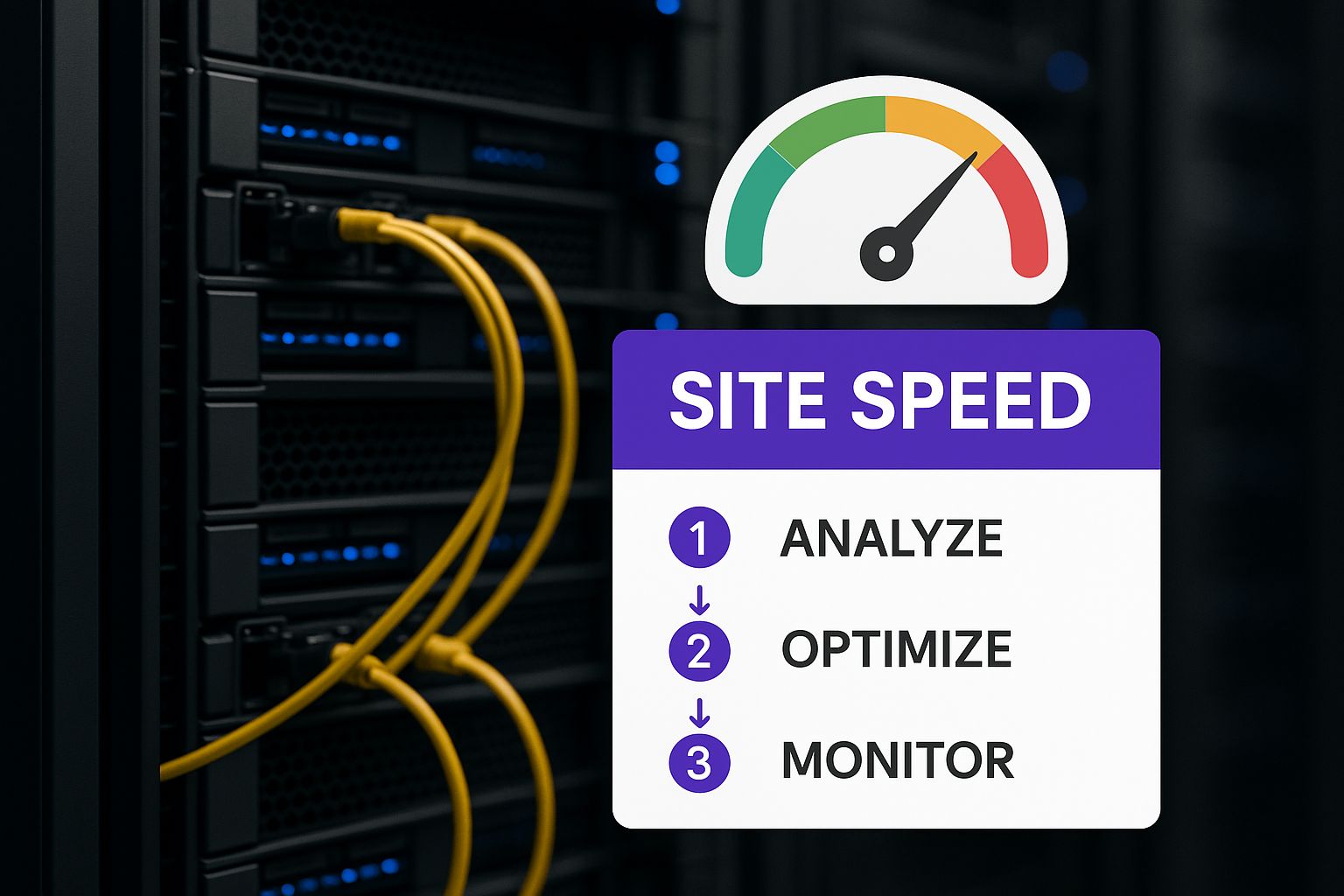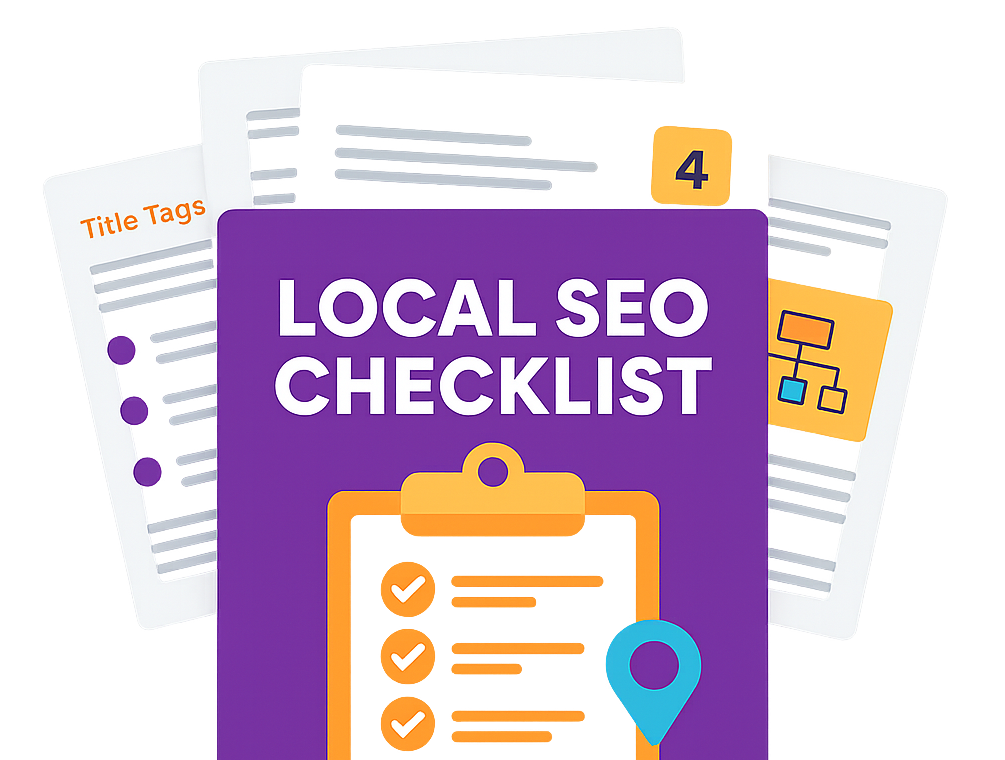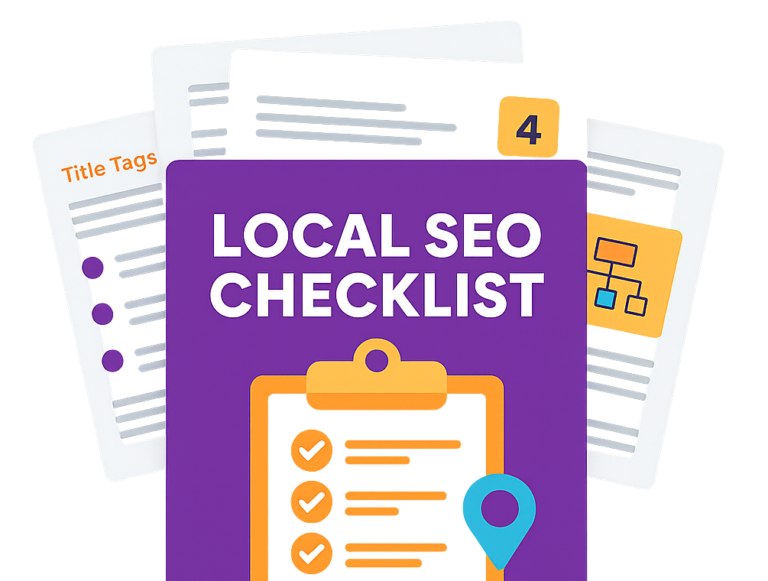Technical SEO consulting is a specialised service that dives deep into your website's technical guts to analyse, fix, and fine-tune its performance for search engines. Think of it like bringing in an expert architect to inspect your building’s foundations, making sure search engines like Google can easily find, crawl, and understand your content.
Why Technical SEO Is Your Website's Foundation
Imagine spending thousands of pounds designing a beautiful shop filled with amazing products. Now, picture that same shop having dodgy wiring, a confusing layout, and doors that are a pain for customers to open. It doesn’t matter how great your products are; people will struggle to get inside and find what they need. This is exactly what happens to a website built on a shaky technical base.
Technical SEO is the invisible architecture holding up your entire digital presence. It’s not about the words on the page or your brand colours; it’s about making sure the underlying code and server setup work perfectly with search engine algorithms. When it’s done right, your website becomes fast, secure, and a breeze for search engine bots to navigate. If you want to dig into the details, you can explore our full guide on what is technical SEO.
The Pillars of a Strong Technical Base
A good consultant will zero in on several critical areas to build this foundation. These aren't just minor tweaks—they're fundamental elements that directly impact your rankings and the experience you give your visitors.
- Crawlability and Indexability: This is all about ensuring search engines can discover your web pages and add them to their results. Without it, your content is effectively invisible.
- Site Speed and Performance: How fast your pages load is a huge ranking factor. Slow sites frustrate users and get penalised by Google for it.
- Mobile-Friendliness: With most searches now happening on phones, a responsive design isn’t a nice-to-have; it's non-negotiable.
- Secure Connection (HTTPS): A secure site protects your users' data and is a clear signal of trust for search engines.
The screenshot below from Wikipedia gives a great visual breakdown of how various factors, including the technical ones, all feed into a website's overall search engine optimisation.

This diagram neatly separates the good stuff that search engines recommend ("white hat") from the shady tactics they penalise ("black hat"), hammering home why proper optimisation matters so much.
The Growing Demand for Technical Expertise
The importance of this discipline isn't just talk; it's reflected in market trends. In 2023, the SEO and Internet Marketing Consultants market in the United Kingdom was valued at a whopping £20.7 billion, showing steady growth even in a wobbly economy. This demand is coming from businesses finally realising that a rock-solid technical setup is the launchpad for any digital success.
A robust technical foundation isn't just about pleasing search engines; it's about creating a better, faster, and more reliable experience for your human visitors. It directly impacts user trust, engagement, and conversions.
A solid website foundation is absolutely critical for visibility and performance, and mastering these behind-the-scenes aspects of SEO is the key. For a deeper dive into how this applies in the real world, you can explore this comprehensive guide outlining Ecommerce SEO Best Practices.
Ultimately, investing in technical SEO consulting is a strategic move. It ensures your marketing efforts are built to last, preventing future headaches and maximising your return on investment.
What a Real Technical SEO Audit Uncovers
A professional technical SEO audit is so much more than a simple website scan. It’s like a full diagnostic for your site’s health, digging deep to find the hidden problems that sabotage your rankings—issues that are often completely invisible to the naked eye. An expert in technical SEO consulting doesn't just skim the surface; they investigate the core, structural elements that decide if search engines can even find your website, let alone favour it.
Think of it like this: your website’s content is the conversation you’re having with customers. The technical audit checks if the phone line is even working. If there’s no clear connection, your message never gets through.
The entire process usually breaks down into three fundamental pillars, each one absolutely critical for online success.
Crawlability and Indexability
This is the bedrock. The absolute foundation. If Google’s crawlers (often called 'bots') can’t find and understand your pages, nothing else matters one bit. It’s like having a library with no catalogue and blocked-off aisles—the books inside might be brilliant, but nobody can get to them.
A consultant will get into the weeds on several key areas to make sure your site is accessible:
- Robots.txt Analysis: This simple text file is your bouncer, telling search engines which parts of your site they can and cannot enter. A single incorrect line, like
Disallow: /, can accidentally block your entire website from being indexed. One wrong character and you’re invisible on Google. - XML Sitemap Optimisation: Think of your sitemap as the official roadmap you hand directly to search engines. An audit makes sure it’s properly formatted, up-to-date, and free of errors or dead ends. It gives crawlers a clean, easy path to all your important content.
- Crawl Budget Management: Search engines only have so many resources to spend crawling your site—this is your 'crawl budget'. If that budget gets wasted on low-value pages like duplicate content or endless filtered navigation, your most important pages might never get the attention they need.
A common but devastating issue we uncover is a misconfigured robots.txt file on a staging site being accidentally pushed live. This single mistake can de-index a business’s entire online presence overnight, and it's something automated tools often miss.
On-Page Technical Signals
Once search engines can access your site, the next job is to help them understand what each page is about and how it all fits together. This involves looking at the technical signals embedded right in your site’s code and structure—the clues that provide crucial context and meaning.
For example, a consultant will look at:
- Canonicalisation: When you have similar content on multiple URLs, you need to tell Google which version is the 'master' copy. Without proper canonical tags, you risk splitting your SEO authority and creating nasty duplicate content issues.
- Structured Data (Schema Markup): This is a special type of code that helps search engines understand your content on a much deeper level. Get it right, and you can unlock rich results in search, like star ratings for products or event details. It makes your listings far more eye-catching.
- URL Structure: Clean, logical URLs that include keywords are just easier for everyone—both users and search engines—to understand. An audit will flag any messy, parameter-filled URLs that could be confusing crawlers and hurting your rankings.
All these on-page elements are vital for communicating relevance. To see how these fixes contribute to a wider strategy, you can learn more about the comprehensive technical SEO services that tie all these pieces together.
Site Performance and User Experience
Finally, an audit zeroes in on how your website actually performs for real people. Google wants to rank sites that deliver a fast, secure, and seamless experience, especially on mobile. A slow or clunky website is a massive red flag that signals poor quality.
A consultant will meticulously analyse your Core Web Vitals, which are Google’s official metrics for measuring user experience. This includes how quickly your main content loads, how soon someone can interact with the page, and whether the layout jumps around unexpectedly.
Even a one-second delay in page load time can cause a significant drop in conversions. The audit ensures every technical detail is fine-tuned for speed and stability, giving you a serious competitive edge.
The Consulting Journey From Audit To Action
Getting into technical SEO consulting isn’t like buying a one-off report. Think of it as a structured partnership, designed to turn a mountain of technical insights into a clear growth strategy. The whole point is to transform a complicated audit—often full of code and server jargon—into a prioritised action plan your team can actually get behind and execute. It's a collaborative process, completely transparent, and focused squarely on hitting your business goals.
The journey kicks off with a discovery phase. This is much more than a quick chat; it's a deep dive into your business objectives, who you're trying to reach, and what’s currently causing you headaches. Your consultant needs to get inside your head and understand what success really looks like for you. Is it generating more leads? Boosting e-commerce sales? Or maybe just getting your brand seen more? Nailing this alignment from the start is crucial because it shapes every single step that follows.
After that, the consultant dives into the comprehensive audit phase we touched on earlier. They’ll use a whole suite of powerful tools, combined with good old-fashioned manual checks, to forensically examine your website's technical health. No stone is left unturned.
From Data Overload to a Clear Roadmap
Once the audit is done, you get the findings. An inexperienced consultant might just email over a 100-page document choked with technical errors and wish you luck. A real partner, however, does the heavy lifting of translating that raw data into a strategic roadmap.
This roadmap is the heart of the engagement. It doesn't just list problems; it prioritises them based on impact and effort. For instance, fixing a critical crawl block that's making half your site invisible to Google is going to be a much higher priority than a minor warning about schema markup. The goal is to tackle the fixes that will move the needle the most, right from the get-go.
This prioritisation framework usually breaks down into three buckets:
- Quick Wins: These are high-impact, low-effort tasks that can deliver an almost immediate boost in performance.
- Core Projects: These are the more involved fixes that sort out foundational issues, like improving your Core Web Vitals or restructuring the site architecture.
- Long-Term Improvements: This covers ongoing optimisation and bigger strategic projects to ensure you keep growing and don't build up technical debt down the line.
The real value of a technical SEO consultant isn't just in finding problems—it's in knowing which problems to solve first. A well-prioritised roadmap separates urgent, high-impact fixes from minor issues, ensuring your development resources are spent where they matter most.
The sheer scale of this process is mirrored in the market's growth. The UK’s SEO software market, which is essential for these technical audits, is already a multi-billion pound industry. Forecasts are predicting a compound annual growth rate of 13.5% between 2025 and 2030, all driven by the growing need for these precise technical improvements. This really shows how vital these detailed analytical processes have become for any business wanting a competitive edge. You can find more market insights from Grand View Research's analysis of the UK SEO software sector.
Implementation and Performance Tracking
The final phase is all about action and accountability. A good consultant doesn't just hand over the plan and vanish. They stick around, working alongside your development team to provide clear guidance, answer questions, and double-check that fixes have been rolled out correctly. This hands-on approach is vital for avoiding misinterpretations that could cause even more problems.
Throughout all of this, performance is tracked meticulously. The consultant will set up dashboards to keep a close eye on key metrics like organic traffic, keyword rankings, crawl errors, and site speed.
Here’s a look at how a key metric like site speed is monitored, which is a crucial part of the performance tracking phase.

This kind of focused monitoring gives you clear, undeniable evidence of progress, showing the direct impact of the technical optimisations on your site's health and performance. It's a continuous feedback loop that makes sure the strategy stays on track and delivers measurable results, proving the return on your investment.
Right, let’s talk about the money side of things. Figuring out how much to budget for a technical SEO consultant in the UK is a big question, and the honest answer is: it depends.
Pricing isn't a simple, off-the-shelf number. It’s shaped by what you need, how complicated your website is, and the level of expertise you're bringing on board. Think of it less like buying a product and more like hiring a specialist tradesperson for your house – the cost depends on the size of the job.
Most consultants and agencies in the UK work with one of three pricing models. Each is designed for different scenarios, whether you need a one-time diagnostic or a long-term partner to keep your site in top shape.
Project-Based Fees for One-Off Audits
If your goal is a deep-dive health check of your website, a one-off project fee is the way to go. This is perfect for uncovering hidden issues, preparing for a tricky site migration, or simply getting a clear strategic roadmap before you commit to anything long-term.
For a one-off technical audit, you can expect to pay anywhere from £1,000 to over £30,000. Why the huge range? It all comes down to the size and complexity of your site. A small local business with a few dozen pages will sit at the lower end. A huge e-commerce platform with thousands of URLs? That’s a much bigger beast to tame, requiring far more time and resources to analyse properly.
Monthly Retainers for Ongoing Support
For businesses that need more than just a one-time fix, a monthly retainer is the standard. This model keeps an expert in your corner, constantly monitoring performance, advising on Google's latest updates, and working alongside your team to implement changes from the initial audit.
Monthly retainers in the UK typically range from £500 to £5,000+. This kind of ongoing partnership is ideal for making sure your site doesn't just get healthy, but stays healthy. It’s an investment in sustainable growth, helping you keep up with algorithm changes and avoid slipping back into bad habits.
A monthly retainer transforms your relationship with a consultant from a one-time fixer to a long-term strategic partner. This continuous oversight is vital for future-proofing your website against technical debt and algorithm updates.
Hourly Rates for Specific Tasks
Sometimes, you don’t need the whole nine yards. You might just have a nagging indexing issue you can’t solve, or need help mapping out some complex redirects. For these smaller, more specific jobs, paying by the hour offers the most flexibility.
Hourly rates for expert technical SEO consulting in the UK generally fall between £50 and £300. The rate reflects the consultant’s experience and the niche skill set required. It’s a smart, cost-effective way to get high-level help for targeted problems without locking into a long-term contract.
There's a good reason why technical SEO takes up a significant chunk of digital marketing budgets in the UK. SEO managers often set aside about 25% of their total SEO spend for technical work alone. The industry is robust, with over 7,600 digital marketing agencies operating in the UK, a great many of them specialising in the technical side of things. This means there's a competitive market with plenty of options to fit different business needs. If you're curious about the industry's scale, you can find more UK SEO agency statistics to get a better picture.
How to Choose the Right Technical SEO Partner
Finding the right technical SEO consultant is a massive business decision. This isn't just about hiring someone to ‘do SEO’; it’s about bringing in a specialist to work on the very foundations of your online presence. Get it right, and you can unlock huge growth. Get it wrong, and you're looking at wasted budgets and, in the worst cases, technical mistakes that can seriously damage your site.
Think of this as your practical checklist for vetting potential partners. By asking the right questions and knowing what to look for, you can make a confident hiring decision that sets your website up for success.

Assess Their Experience and Specialisation
Not all SEO is created equal. A generalist might be great for content or link building, but they may not have the deep expertise needed for complex technical challenges. Your first job is to dig into a candidate's specific background. A true technical specialist lives and breathes the back end of websites.
Start by asking about their experience with websites similar to yours—in size, industry, and platform (e.g., Shopify, WordPress, a custom build). An e-commerce site has completely different technical needs from a local service business or a large publisher. If they’re already familiar with your setup, they can spot common issues and implement proven solutions much faster.
Evaluate Their Communication Style
Let’s be honest, technical SEO is notoriously complex. The best consultants aren't just code experts; they are brilliant translators who can explain intricate problems and their solutions in plain English. They need to communicate clearly with everyone, from the C-suite to your dev team.
During your initial chats, pay close attention to how they describe their process. Do they hide behind jargon, or do they make a real effort to make sure you understand? A huge part of technical SEO consulting is bridging the gap between technical findings and business impact.
A consultant who can’t explain a complex problem in simple terms probably doesn’t understand it well enough themselves. Clarity in communication is a direct reflection of expertise and is non-negotiable for a successful partnership.
This skill is crucial when it comes to collaboration. Ask them directly how they work with development teams. They should be able to provide clear, actionable tickets and documentation that make it easy for your developers to implement fixes without any guesswork.
Scrutinise Case Studies and Testimonials
Proof of past success is your most reliable indicator of future performance. Don't just settle for a list of previous clients; ask for detailed case studies that outline the specific challenges, the actions taken, and the measurable results they achieved.
When you’re reviewing their work, look for evidence that goes beyond vanity metrics. Instead of just "increased traffic," you want to see specifics like:
- Improved Indexation: Did they get more of the client's important pages indexed by Google?
- Enhanced Site Speed: Can they show you before-and-after data for Core Web Vitals?
- Resolved Crawl Errors: Do they have examples of how they cleaned up critical errors in Google Search Console?
These are the kinds of tangible outcomes that demonstrate real mastery. Don't be shy about asking for references you can speak to directly, either. Hearing from a past client gives you invaluable insight into a consultant’s reliability and working style.
For smaller businesses where the budget is a major factor, finding a partner who delivers these kinds of results is vital. You can find more information on affordable SEO services for small business that focus on high-impact solutions. Choosing the right partner ensures every penny is well-spent, delivering a strong return from the get-go.
The Tangible Business Impact of Technical Excellence
Expert technical SEO consulting is about more than just cleaning up code and tweaking server settings. It’s about connecting that clean website foundation directly to your bottom line. When your site is technically sound, it’s not just search engines that notice; your customers do, too.
A well-optimised site gets crawled and indexed far more efficiently by Google. This means your most important pages—the ones that drive sales and leads—are discovered and ranked faster. The result? A direct and sustainable increase in organic traffic, bringing more potential customers to your digital doorstep without you having to pay for every single click.
Driving Revenue Through User Experience
Site speed is a perfect example of technical SEO’s commercial impact. A fast, responsive website creates a far better user experience, which is crucial for keeping visitors engaged. It's a known fact that a one-second delay in mobile load times can slash conversion rates by up to 20%.
By optimising Core Web Vitals and improving performance, a consultant ensures your site is a pleasure to use. This simple fix reduces bounce rates and encourages visitors to stick around long enough to complete a purchase or fill out a form.
Ultimately, the true measure of technical excellence is how it contributes to key business metrics. One of the most important is learning how to improve website conversion rates. A fast, seamless journey from landing page to checkout is one of the most powerful drivers of revenue you can have.
Enhancing Brand Authority and Trust
A technically sound website is a strong signal of professionalism and authority. When your site is secure (using HTTPS), free from broken links, and easy to navigate on any device, it builds genuine trust with your audience. This positive perception not only encourages repeat visits but also strengthens your brand’s reputation in the eyes of search engines.
A robust foundation also allows your other marketing efforts to flourish. For instance, a strong site architecture makes it much easier to implement smart internal linking strategies for SEO in 2025, spreading authority throughout your website and guiding users to your most valuable content.
Fixing a 'small' technical flaw, like a broken redirect chain or a slow-loading mobile page, isn't just about housekeeping. It can unlock significant commercial growth by removing friction from the customer journey and improving your competitive advantage.
Future-Proofing Your Digital Asset
Finally, investing in technical excellence is a long-term strategy. It helps you avoid accumulating costly technical debt—the implied cost of rework caused by choosing an easy, quick fix now instead of using a better approach that would take longer.
A proactive consultant ensures your website stays compliant with ever-evolving search engine algorithms and web standards. This future-proofs your digital asset, preventing sudden traffic drops after a major Google update and ensuring your online presence remains a powerful, reliable engine for business growth.
Still Have Questions About Technical SEO Consulting?
Jumping into the world of technical SEO consulting can feel a bit overwhelming, and it's natural to have questions. Let's clear up some of the most common ones businesses ask, so you can see exactly what's involved and the value it brings.
How Long Does It Take to See Results?
This is the big question, and the honest answer is: it depends. Some fixes deliver results almost immediately. For example, if your robots.txt file is accidentally blocking Google from seeing half your site, correcting that can improve crawlability within a few weeks. Search engines tend to notice big changes like that pretty quickly.
On the other hand, more complex improvements take time. A full-scale project to boost your site speed and nail your Core Web Vitals might take several months before Google fully recognises the changes and rewards you in the rankings. A good consultant will always give you a clear roadmap that prioritises the work and sets realistic timelines.
Can My Team Handle Technical SEO Without a Consultant?
Your in-house team might be great at managing day-to-day tasks, but technical SEO is a different beast altogether. It’s a deeply specialised field that’s constantly evolving. A professional consultant brings years of diagnostic experience from working on hundreds of different websites, not to mention a toolkit of specialised software.
They’re trained to spot the subtle, underlying issues that automated tools almost always miss. More importantly, they understand how to implement fixes without accidentally breaking something else on your site. For any business that’s serious about growth, that focused expertise is an investment, not just a cost.
What Is the Difference Between Technical SEO and General SEO?
It helps to think of your entire SEO strategy as a three-legged stool. Each leg is essential for stability and success.
- Technical SEO: This is the foundation. It’s all about making sure search engines can find, crawl, index, and understand your website efficiently.
- On-Page SEO: This is your content. It covers everything from the keywords you target to how you structure your articles and service pages.
- Off-Page SEO: This is your authority. It’s about building trust and credibility through backlinks and other signals from around the web.
Technical SEO is the bedrock that everything else is built on. Without a solid technical foundation, even the best content and link-building strategies will fail to deliver their full potential. It’s like building a house on sand.
Does My Small Business Website Really Need a Consultant?
Absolutely. It’s a common misconception that technical SEO is only for huge, complex websites. The truth is, every website needs a rock-solid technical foundation to compete online. For a small business, getting the technical details right can be the very thing that helps you outrank a much larger competitor.
A consultant can quickly pinpoint the highest-impact changes for your specific goals, whether that’s making sure your site is fast, mobile-friendly, or free from errors that are secretly holding you back. It’s a targeted approach that delivers a serious return on your investment.
Ready to build a rock-solid foundation for your website? At Bare Digital, we provide a free, no-obligation SEO Health Check to identify the technical issues holding you back. Get your personalised activity plan and see how our specialist technical SEO consulting can drive real growth.
Find out more at https://www.bare-digital.com.








